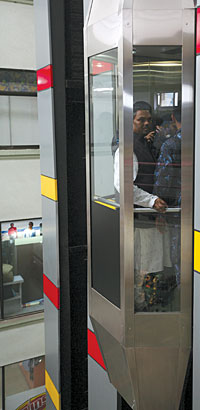 KIRAN PANDAY |
And if there is one major hurdle ahead of the new coaltion it is the issue of integration and rehabilitation. But for that the prime minister will have to cross the first hurdle of actually forming a government. The political void in Kathmandu has enforced the perception of a weak state. This in turn has led to further erosion of the rule of law, institutionalised impunity and has fanned anarchy.
A traffic accident brings the northern half of the city to a standstill for two days. Kids deflate bicycle tyres to enforce bandas. Police look on as the YCL thrashes the YF in Banepa and vice versa. More worryingly, the three main parties are behaving as if they can do anything (see p 10-11). Development has ground to a halt as cadre plunder the district budgets for road contracts. There is now such criminalisation of politics and the politicisation of criminality that it is becoming difficult to tell the difference between a politician and a dacoit.
The security apparatus that is most in touch with the public, the Nepal Police, has had no chance to recover from its politicisation, a process that began after 1990. Police say they are powerless to stop gangsters because they have patronage from biggies. They can't even arrest hoodlums stoning a school bus without cabinet authorisation.
Improving the efficiency of the police force is essential to check this country's malignant lawlessness. The single most widespread demand among people across Nepal today is law and order. They are fed up with highway blockades, strikes, curfews and crime.
New retirement rules provide the government with an opportunity to boost the morale of the police and hence reassure the public that they are safe. A younger police leadership is welcome despite attendant risks of inexperience: immaturity is preferred over incompetence. However, changes at the top of the police force aren't enough. Intelligence-based community policing that prevents crime requires that the political class cooperate with the law and order machinery, and not be on the side of criminals.
The most important component of police reform has to do with the functional freedom of law enforcement agencies. They must be given the authority to apprehend on the spot any militant youth member of a political front organisation who engages in vandalism or threats.
These aren't things that need a complete and functioning cabinet. It's the duty of Prime Minister Nepal of Nepal to ensure that his citizens are safe.


